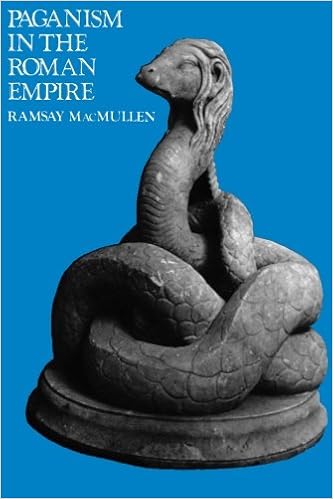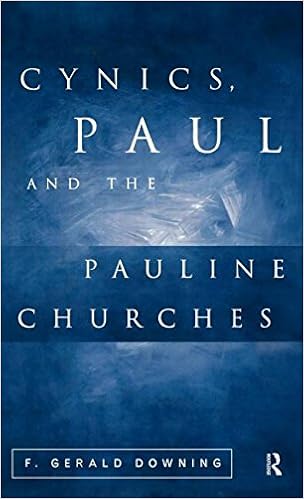This short piece centers on one of Berlin's recurring characters--Carlotta, a woman who drinks and drugs her way through much of life and whose several marriages are a testimony to her care-free life style. One of her great loves is this, Jesse, the drugged-out friend of one of her sons. Read the story here.
Thursday, June 21, 2018
On "Paganism in the Roman Empire" by Ramsay MacMullen ***
This is a good survey of the pagan religions as they existed between about 100 B.C. and 400 A.D. in the Roman Empire, with an emphasis on the first two centuries of the Christian era. MacMullen notes many of the seeming contradictions that exist when we look at paganism as a whole in the empire and how it is quite impossible to talk of its rise and demise on any kind of decade-long cycle. But mostly MacMullen looks at how Roman society functioned with its wide array of gods pulled in from its various conquered domains.
Pagan religions were part of daily life. They were the means by which social functions happened. The poor, without recourse to large homes in which to host parties, hosted them in temple dining rooms. Festivals, put on by supporters of a particular god, invited people to come celebrate with them--there were parades and other fun activities.
Particular gods became popular, it appears, largely through sponsorship of rich patrons or government officials. They could change with the change of the local legate. People's personal gods--the local gods, the ones of each conquered nation--had more sticking power in the local area. And it, was more than trade or military service, largely slavery that accounted for the spread of a god in new locales, as slave families adhered to the ancient customs.
The rich and educated may have paid for and advocated a particular god. Philosophy may have leaned more and more on the idea of one god--or more properly, the superiority of one god, of which all the gods were manifestations. But the common people remained largely unmoved by such ideas.
As such, there wasn't a lot of missionizing in the sense that we would account for in religious conversion today. The most dominant argument for a deity was generally based around miracles--healings and the like. This was likely the appeal of Christianity, along with the martyrdoms to Christians endured, which were a kind of wonder in themselves.
Gods gained and lost popularity. At the time that Constantine came to power, the Sun was in the ascendant. But had he not converted to Christianity, the process of various other pagan gods gaining popularity for a time would have continued.
If this summary seems somewhat disjointed, that is probably partly because MacMullen's text at times seems this way. There is a clear organization underneath that flows along easily as one reads, but when one goes back to outline the thoughts included, it is a bit difficult, so fluid is the discussion.
Monday, June 11, 2018
On "Personal Foundations of Self-Forming through Auto-Identifications with Otherness" by Nelly Reifler (3041 words) ***
This story discusses philosophical ideas about identity in the form a squirrel who thinks she's a rat, which made me wonder whether I've ever enjoyed a work before written from the point of view of an animal. Read the story here at Barcelona Review.
On "Cynics, Paul, and the Pauline Churches" by F. Gerald Downing ***
This is the second volume of Downing's work on early Christians and Greek Cynicism. In the first volume, he did not see much of Cynicism in Paul's works, but here, he corrects himself, now tying Paul to the Cynicism he sees in Jesus himself and his other disciples.
Methinks Downing overplays his hand here a bit, often repeating the same few facts about Paul that he says show he would have been taking for a Cynic: his state of dress, his public preaching, his scars. Downing says he is not claiming that Paul was a Cynic, but he comes very near to saying so, though he also denotes the Paul pulls back from such ideas in his later letters, as his readers claim too much freedom in misinterpreting his Cynical points. Hence, in Galatians Paul can deny the law. The Thessalonians take Cynic freedom to mean they can give up working; the Corinthians take it to mean they can engage in wanton sexual practices. Paul corrects them, and then by the time he writes Romans and Philippians, he focuses more on Stoic ideas.
Downing does draw out some differences between Cynics and Stoics that are useful. The former tend to act on their "virtue," while the latter tend to internalize it. It's okay to be poor or wealthy, the Stoics would believe, so long as one is happy in the former as well as in the latter; the Cynics, by contrast, would actually do something like make themselves poor.
He also shows that there were different types of Cynics. Not all of them were, or looked like, beggars; not all of them lacked for tact--some were gentle. This ability to metamorphose gives Downing the space to lay claim to the existence of Christian Cynicism. So what if they don't appear the stereotypical Cynic? Cynicism came in many varieties.
The basic outline of Downing's argument is this: Paul would have been taken as a Cynic by the Greco-Roman Gentiles, based on his actions and sayings. Paul likely would have known that he was being taken as such. Paul likely did so deliberately. Gentiles likely responded to him as a Cynic. Because Paul did these things with the blessing of Jesus's apostles, the rest of the Christian movement was likely Cynic in some form also.
While I can't bring myself to think of Christianity as a Jewish Cynicism movement, Downing does make a good argument for how some aspects of the Christian movement may have been perceived, at least superficially, as Cynicism in the early going among some people.
Methinks Downing overplays his hand here a bit, often repeating the same few facts about Paul that he says show he would have been taking for a Cynic: his state of dress, his public preaching, his scars. Downing says he is not claiming that Paul was a Cynic, but he comes very near to saying so, though he also denotes the Paul pulls back from such ideas in his later letters, as his readers claim too much freedom in misinterpreting his Cynical points. Hence, in Galatians Paul can deny the law. The Thessalonians take Cynic freedom to mean they can give up working; the Corinthians take it to mean they can engage in wanton sexual practices. Paul corrects them, and then by the time he writes Romans and Philippians, he focuses more on Stoic ideas.
Downing does draw out some differences between Cynics and Stoics that are useful. The former tend to act on their "virtue," while the latter tend to internalize it. It's okay to be poor or wealthy, the Stoics would believe, so long as one is happy in the former as well as in the latter; the Cynics, by contrast, would actually do something like make themselves poor.
He also shows that there were different types of Cynics. Not all of them were, or looked like, beggars; not all of them lacked for tact--some were gentle. This ability to metamorphose gives Downing the space to lay claim to the existence of Christian Cynicism. So what if they don't appear the stereotypical Cynic? Cynicism came in many varieties.
The basic outline of Downing's argument is this: Paul would have been taken as a Cynic by the Greco-Roman Gentiles, based on his actions and sayings. Paul likely would have known that he was being taken as such. Paul likely did so deliberately. Gentiles likely responded to him as a Cynic. Because Paul did these things with the blessing of Jesus's apostles, the rest of the Christian movement was likely Cynic in some form also.
While I can't bring myself to think of Christianity as a Jewish Cynicism movement, Downing does make a good argument for how some aspects of the Christian movement may have been perceived, at least superficially, as Cynicism in the early going among some people.
Subscribe to:
Posts (Atom)







